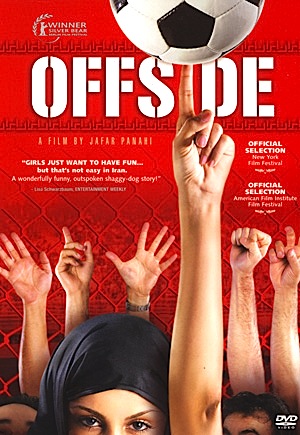By Joe Bendel. Only the current Iranian regime could make patriotism subversive. Supposedly to protect women from harsh language and rampant testosterone, the paternalistic Iranian regime will not allow women to attend men’s sporting events. It may not be the most pressing human rights abuse in Iran, but it is emblematic of the Islamic Republic’s institutionalized misogyny. Produced under difficult circumstances without official sanction, Jafar Panhi’s Offside depicts the unfortunate drama surrounding several young Iranian girls’ coordinated attempt to sneak into a crucial World Cup qualifying match. Like several of his characters, Panahi would soon find himself behind bars. Currently facing a six year prison term on trumped-up charges, Panahi is not likely to attend when Offside screens this Saturday at the Asia Society as part of their important retrospective-tribute to the persecuted filmmaker.
 Disguising themselves as boys, with varying degrees of success, a group of teenage girls successfully bluff their way into the forbidden stadium. Eventually though, they’re rounded up by the equally young military conscripts working the security detail, to be turned over to the morals police at the end of the match. As the young women cool their heels in a holding pen, they try to engage their captors, who have difficulty defending the policy they reluctantly enforce. In fact, several of the female fans seem much more knowledgeable about the game than the soldiers guarding them.
Disguising themselves as boys, with varying degrees of success, a group of teenage girls successfully bluff their way into the forbidden stadium. Eventually though, they’re rounded up by the equally young military conscripts working the security detail, to be turned over to the morals police at the end of the match. As the young women cool their heels in a holding pen, they try to engage their captors, who have difficulty defending the policy they reluctantly enforce. In fact, several of the female fans seem much more knowledgeable about the game than the soldiers guarding them.
Since Panahi was (not surprisingly) denied official permission to film Offside, he shot rebel-style on digital video, which gives the film a definite cinema vérité look. Panahi’s brave cast of non-professionals duly avoids any sense of affectation. Although some young actors are perhaps a tad uncomfortable in their roles, many, like Shayesteh Irani as the tomboyish “Smoking Girl,” are consistently quite good.
As a film Offside is certainly engaging, as a sort of the dystopian version of Bend it Like Backham, but only too real. Yet it is particularly valuable as an intimate, unfiltered snapshot of Iranian life. Far from a full scale indictment of the Iranian regime, Offside is a small, but telling, slice of everyday absurdism. To borrow an American cliché, one cannot use the film to question Panahi’s patriotism. In fact, the film is suffused with a love of country, as the young fans want nothing more than to chant and cheer for their beloved national team.
Reportedly, even though Offside had only been screened once in Iran at the time of its initial American release, word of the film helped temporarily overturn the ban on women at sporting events, until the religious authorities vetoed the policy change. Offside might seem slight—a group of women simply trying to watch a sporting event—but it signifies the act of questioning authority, even ending with a very minor rebellion of sorts, foreshadowing the Green almost-Revolution.
In addition to his six year sentence, the Iranian government has also imposed a twenty year filmmaking ban on Panahi. This punishes not just the filmmaker, but all Iranian citizens and world cineastes. Winner of the Silver Bear at the 2006 Berlin International Film Festival (Berlinale), Offside is an excellent example of what the world is losing through the mullahs’ oppression. It screens this Saturday (2/26) at the Asia Society and tickets are free.
Posted on February 22nd, 2011 at 12:46pm.
One thought on “Jafar Panahi (Not) At The Asia Society: Offside”
Comments are closed.